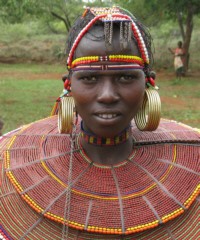Kalenjin, Pokot in Kenya

Photo Source:
Gary Glahn
|
Send Joshua Project a map of this people group.
|
| People Name: | Kalenjin, Pokot |
| Country: | Kenya |
| 10/40 Window: | No |
| Population: | 144,000 |
| World Population: | 353,000 |
| Primary Language: | Pokoot |
| Primary Religion: | Ethnic Religions |
| Christian Adherents: | 45.00 % |
| Evangelicals: | 3.00 % |
| Scripture: | Complete Bible |
| Ministry Resources: | Yes |
| Jesus Film: | Yes |
| Audio Recordings: | Yes |
| People Cluster: | Nilotic |
| Affinity Bloc: | Sub-Saharan Peoples |
| Progress Level: |
|
Introduction / History
The Pokot are part of the Kalenjin people who were highland Nilotic people who originated in southern Ethiopia and migrated southward into Kenya as early as 2,000 years ago. They live in Kenya and Uganda.
What Are Their Lives Like?
Though the Pokot consider themselves to be one people, they are basically divided into two sub-groups based on livelihood. About half of the Pokot are semi-nomadic, semi-pastoralists who live in the lowlands west and north of Kapenguria, as well as throughout Kacheliba Division and Nginyang Division in Baringo District. These people herd cattle, sheep, and goats and live off the products of their stock. The other half of the Pokot are agriculturalists who live anywhere conditions allow farming.
The homestead is the social center for the Pokot. Here a man lives with his wives, each having their own hut. All members of the family live here and the stock is corralled here at night. The man of the family rules the homestead, telling the others what duties they are to perform.
What Are Their Beliefs?
The majority of the Pokot still follow their traditional religion. Some of the Pokot are Christians, but the majority are traditionalists. Even among the Christians, the traditional religious worldview is still dominant.
Illness and death are greatly feared among the Pokot. Death is the end of life, and there is no afterlife. Therefore, life is most important and is precious to the Pokot. Much of their religious ritual involves warding off illness or effecting cures.
What Are Their Needs?
Women have no dignity or respect in Pokot society. A woman has no voice in any public forums and no authority within her own homestead. She is considered "foolish", like the cows for which she is traded.
Prayer Points
Pray for Pokot Kalenjin husbands to love and respect their wives and always remain faithful to them.
Pray for Pokots to understand that the Lord can and will provide for all their spiritual and material needs when they put their trust in him.
Pray for revival fire to abundantly bless Pokot Kalenjin churches and families.
Pray that soon Pokot Kalenjin churches will be preparing and sending workers to the least-reached parts of Africa.